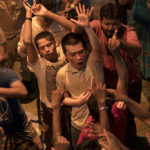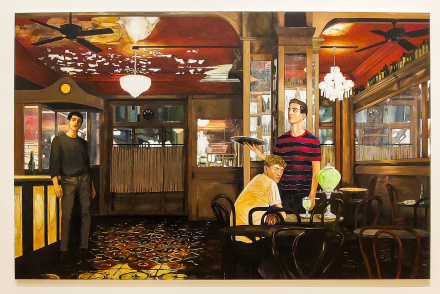2013.10.20 Kesen-cho
- Photography (Photography)
Naoya Hatakeyama
Naoya Hatakeyama’s series Rikuzentakata (2011) documents the devastating aftermath of the 2011 Tohoku earthquake and tsunami in Japan. Throughout the series of sixty C-prints (five of which are included in the Kadist Art Foundation’s collection), Hatakeyama’s photographs depict scenes of torn landscapes and leveled homes, demolished villages and massive piles of detritus pummeled beyond recognition. The images serve as records of disaster, seemingly driven by an intense need to bear witness to collective trauma. Hatakeyama’s photographs, however, emerged from a painful and personal grief: the series focuses on the near-destruction of the artist’s hometown, an event which resulted in both his mother’s death and the deaths of many friends and neighbors. Rikuzentakata bears the ethical weight and responsibility of photojournalism even as its genesis comes out of a deeply felt loss and the ambiguity of survivor’s guilt. But for every desolate landscape on view in Rikuzentakata , Hatakeyama also offers glimpses of possible regeneration and hope: in 2013.10.20 Kesen-cho (2013), a forest of evergreen trees suggests the possibility for new growth amongst an overturned and muddied hillside, while a faint rainbow streaking across the sky in 2012.3.24 Kesen-cho (2013) offers a familiar but poetic gesture towards a better future. Hatakeyama suggests that what’s lost can never be fully recovered, but that with time, those wounds can slowly heal and life can begin again.
Naoya Hatakeyama is one of Japan’s leading contemporary photographers. His work frequently explores the relationship between natural and built environments, and he is particularly invested in examining how urbanization produces violent effects in surrounding landscapes. In 2012, Hatakeyama was the subject of a mid-career retrospective at SFMOMA titled Naoya Hatakeyama: Natural Stories, an exhibition of large-scale photographs centered around themes of nature, destruction, and human will. His photographs have been acquired by many international collections such as the National Museum of Modern Art, Osaka; the National Museum of Modern Art, Tokyo; Tokyo Metropolitan Museum of Photography; the Museum of Fine Arts, Houston; Yale University Art Gallery, New Haven; the Swiss Foundation for Photography, Winterthur; la Maison Européenne de la Photographie, Paris; and the Victoria & Albert Museum, London.
Colors:
Related works of genres: » japanese contemporary artists, » japanese photographers
» see more

© » KADIST
Koki Tanaka
2009Walking Through is one of a series of videos—sometimes humorous, often absurd—that record the artist’s performative interactions with objects in a particular site...

© » KADIST
Koki Tanaka
2013This artwork was part of a group of projects presented in the Japanese Pavilion at the Venice Biennale in 2013...

© » KADIST
Koki Tanaka
2010Tanaka’s unique understanding of objects and materials is reflected in the four photographs that document his Process of Blowing Flour ...

© » KADIST
Aki Sasamoto
2012Poetry Light Stool evokes the spirit of Fluxus, the intermedia movement that encouraged artmaking to be simple, fun, and address everyday life...
Related works featuring themes of: » Japanese
» see more

© » KADIST
Tomoko Yoneda
2010Yoneda’s Japanese House (2010) series of photographs depicts buildings constructed in Taiwan during the period of Japanese occupation, between 1895 and 1945...

© » KADIST
Koki Tanaka
2009Walking Through is one of a series of videos—sometimes humorous, often absurd—that record the artist’s performative interactions with objects in a particular site...

© » KADIST
Koki Tanaka
2013This artwork was part of a group of projects presented in the Japanese Pavilion at the Venice Biennale in 2013...

© » KADIST
Motoyuki Daifu
2010Seven family members and a cat all squeezed into the small five-room house, where Motoyuki Daifu grew up in Yokohama...
Other related works, blended automatically
» see more

© » KADIST
Naoya Hatakeyama
Naoya Hatakeyama’s series Rikuzentakata (2011) documents the devastating aftermath of the 2011 Tohoku earthquake and tsunami in Japan...

© » KADIST
Tomoko Yoneda
2010Yoneda’s Japanese House (2010) series of photographs depicts buildings constructed in Taiwan during the period of Japanese occupation, between 1895 and 1945...

© » KADIST
Koki Tanaka
2009Walking Through is one of a series of videos—sometimes humorous, often absurd—that record the artist’s performative interactions with objects in a particular site...

© » KADIST
Koki Tanaka
2010Tanaka’s unique understanding of objects and materials is reflected in the four photographs that document his Process of Blowing Flour ...
Related works sharing similar palette
» see more

© » ARTS EQUATOR
Weekly Southeast Asia Radar: Vietnam's new costume institute; Is Penang's art scene dead? | ArtsEquator Thinking and Talking about Arts and Culture in Southeast Asia ArtsEquator Radar Jitti Chompee October 22, 2019 ArtsEquator’s Southeast Asia Radar features articles and posts about arts and culture in Southeast Asia, drawn from local and regional websites and publications – aggregated content from outside sources, so we are exposed to a multitude of voices in the region...

© » LONDONIST
How To Spend Christmas 2023 In London | Londonist Christmas In London 2023: A Guide To Festive Events, Food And Drink In The Capital This Winter By Londonist Londonist Christmas In London 2023: A Guide To Festive Events, Food And Drink In The Capital This Winter The 2023 Oxford Street Christmas lights...

© » KADIST
Cauleen Smith
2018Set to the iconic and spiritual music of Alice Coltrane’s Turiyasangitananda (1937–2007), Cauleen Smith’s film Sojourner travels across the US to visit a series of sites important to an alternative and creative narrative of black history...

© » ARTS EQUATOR
"A Land Imagined" and The Ghosts We Forget | ArtsEquator Thinking and Talking about Arts and Culture in Southeast Asia Articles Photo courtesy of Akanga Film Asia & Philipp Aldrup Photography Photo courtesy of Akanga Film Asia & Philipp Aldrup Photography February 21, 2019 By Alfonse Chiu (1200 words, six-minute read) The three definitions of the word “ghost” from the Oxford dictionary are as follows: the first, “an apparition of a dead person which is believed to appear or become manifest to the living”; the second, “a slight trace or vestige of something”; and the third, “a faint secondary image caused by a fault in an optical system, duplicate signal transmission, etc.” In all three, presence is a suggestion of memory, amenable to corrections by means of a quick scrub of one’s spectacles...
Other works by: » Naoya Hatakeyama
» see more

© » KADIST
Naoya Hatakeyama
Naoya Hatakeyama’s series Rikuzentakata (2011) documents the devastating aftermath of the 2011 Tohoku earthquake and tsunami in Japan...

© » KADIST
Naoya Hatakeyama
Naoya Hatakeyama’s series Rikuzentakata (2011) documents the devastating aftermath of the 2011 Tohoku earthquake and tsunami in Japan...

© » KADIST
Naoya Hatakeyama
Naoya Hatakeyama’s series Rikuzentakata (2011) documents the devastating aftermath of the 2011 Tohoku earthquake and tsunami in Japan...

© » KADIST
Naoya Hatakeyama
Naoya Hatakeyama’s series Rikuzentakata (2011) documents the devastating aftermath of the 2011 Tohoku earthquake and tsunami in Japan...
Related works found in the same semantic group
» see more

© » KADIST
Guy Woueté
2019The video installation Le Fou Postcolonial Insane by Guy Woueté is a series of five videos that examine the concept of insanity in the post-colonial Democratic Republic of Congo...

© » ARTOBSERVED
Hernan Bas
Hernan Bas’s recent works, particularly his series “The Conceptualists,” showcase his continued exploration into the realms of queerness, desire, the occult, and the absurd...


